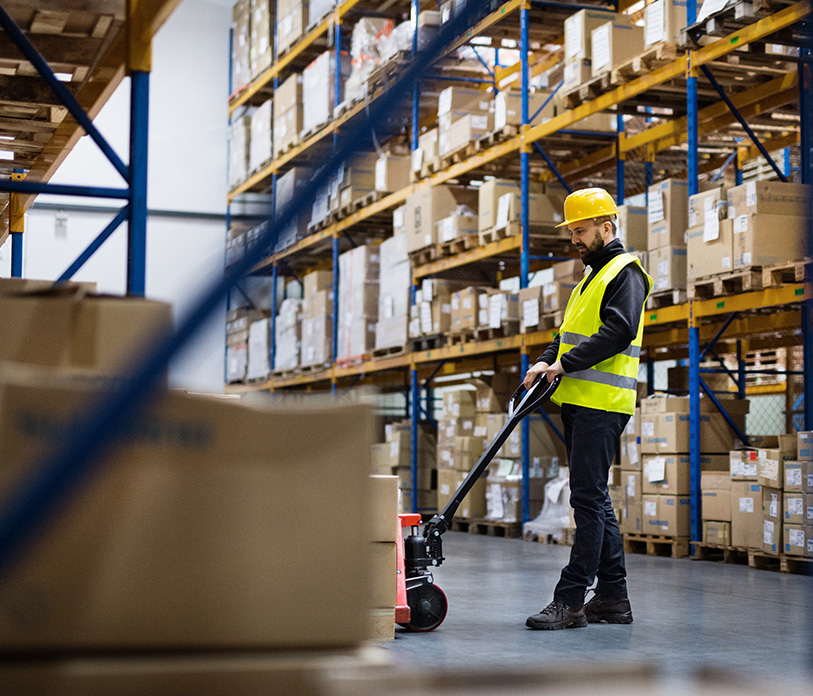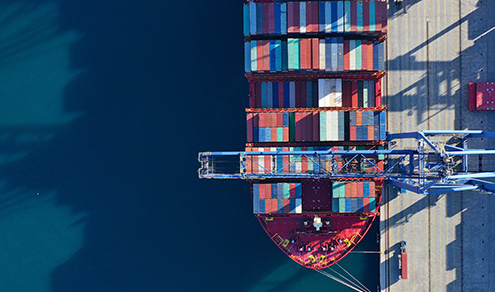Blog
Supply Chain Optimization: Everything You Need To Know
Contact Us

Great logistics management is the very backbone of an efficiently run supply chain. However, many logistics operations face similar challenges: the sheer volume of tasks coordinating each process and step. From inventory management to order processing, the manual processes involved in these tasks can lead to delays and missed opportunities, causing a knock-on effect on the rest of your supply chain. Mitigate all these challenges and more with intelligent automation for logistics.
Intelligent automation (IA) combines robotic process automation (RPA) with other cognitive technologies like artificial intelligence (AI) and business process management (BPM) to perform all the manual, repetitive and time-consuming processes in your logistics operations. From the very beginning, you can make smarter decisions, innovate faster and drive bigger growth.


By implementing automation, logistical processes can be streamlined. You can perform tasks previously done manually, such as order processing and inventory management, without human intervention. Not only does this speed up operations, but it also reduces errors, minimizes delays and frees staff for more strategic work. The advantages of automation are abundant.

Work your logistics smarter, not harder, with SS&C Blue Prism’s combination of IA for a complete logistics data management solution — consolidate, reconcile, cleanse, master and analyze data — then deliver in a format that allows actionable, visual analytics. Along with our partner ecosystem, your logistics management goals have never been easier to achieve.
Enhance freight management
Optimize routes, freight accounting and freight claim management with digital workers. This ensures you can maximize your resources throughout the entire logistics operations and transport goods more efficiently.
Optimize supply and production levels
Get real-time data to anticipate customer needs and automatically adjust stock and production levels to suit them. Easily scale up or down depending on demand and proactively minimize excess inventory, reduce stockouts and enhance overall responsiveness with help from warehouse automation.
Better customer service
Digital workers help improve communication with your customers and suppliers. With faster order processing and accurate inventory management, you can communicate these accurately to your customers and suppliers, fostering trust and satisfaction.
Improve tracking
Ramp up your production with demand, monitor inventory levels, order supplies and efficiently track supply chain deliveries. RPA in your supply chain provides you with real-time data and analytics so you can make the most informed decisions, identify trends and proactively address challenges.
Save costs
Logistics automation can optimize processes and drastically reduce errors, labor costs and waste — leading to cost savings for your operations. This cost-effectiveness arises from increased accuracy, efficiency and reduced rework requirements.
Easy to scale
Logistics automation systems can be easily scaled up or down to adapt to changes in business growth demands. This allows logistics operations to expand or contract without the need for significant adjustments and additional stress on workers.
After identifying low stock levels, IA, RPA and automated storage and retrieval systems (AS/RS) can automate the replenishment process to ensure you have the right inventory levels. By integrating with inventory management systems, digital workers can generate purchase orders, coordinate with suppliers and track delivery statuses — ensuring timely restocking to prevent stockouts or overstocks.
An automated solution can:
When an order comes in, IA and digital workers can streamline the processing workflow to ensure accuracy and efficiency in your logistics operations. Digital workers can enter orders, verify them and fulfill them seamlessly. Using IA also helps minimize errors to reduce reworks and enhance overall customer satisfaction.
IA can help:
IA can analyze delivery routes and optimize them to minimize transportation costs and improve delivery efficiency. It can look at live traffic patterns and delivery locations and then intelligently generate optimized routes for drivers, ensuring timely and cost-effective deliveries. RPA in shipping can also help optimize cargo routes.
Automation can:
Using IA, businesses can implement predictive maintenance strategies to anticipate equipment failures, prevent costly downtime and ensure smooth logistics processes. Digital workers can collect real-time performance metrics, while IA can identify potential issues before they occur.
Automation software can help:
IA provides comprehensive supply chain visibility by enabling real-time tracking and monitoring for all stakeholders involved, including supply chain managers, customers, suppliers, carriers and other logistics partners. Stakeholders can gain visibility into the entire supply chain, from order placement to final delivery.
Automation supports:
We have noticed that automation creates a lot of job satisfaction. Employees have time for their core tasks and can focus on adding as much value as possible to the port business. We also see RPA as a first step towards further intelligent automation.”
RPA lead, Port of Rotterdam
None of the airlines were prepared for it. In one day, we went from hundreds of thousands of people flying down to zero. The backlog was huge, we had millions of change requests were coming in. We were able to respond rapidly by using intelligent automation.”
Site Operations Manager, Lufthansa InTouch
Blog
Supply Chain Optimization: Everything You Need To Know
Blog
Do I Need Inventory Management Automation?
White Paper
Supply Chain Optimization: The Case for Automation
If your network blocks YouTube, you may not be able to view the video on this page. In this case, please use another device. Pressing play on the video will set third-party YouTube cookies. Please read our Cookies Policy for more information.